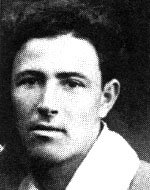Grabowski, Chaim
Son of Ronia and Menahem. Born in 1898 in Rosh Pina, one of the ten children of the well-known guard of Migdal Farm, who died from the black-blood drill, Haim grew up in Rosh Pina, where he attended elementary school and at his parents’ home was educated for a life of work, contentment and courage. Because he was a young man from the Grabowski family, he did not have any land left in the moshavah, so he moved with his wife and their eldest son Menachem to live in one of the half-destroyed farms of the Wakaz farm, far from Rosh Pinna. He kept trees in the fields of Migdal, dried swamps in the Zebulun Valley, and dug irrigation canals in Netanya and at the Tiomkin level, many years later, The Arab fellahin in the area used to say about Chaim: “When his hand presses on the kibbutz, the oxen sleep at night on their backs [from exhaustion].” He was elected to the settlement committee and with the outbreak In 1936, the Arabs destroyed the water installation that supplied water to the Jordan River, forcing the farmers to descend to a spring that spilled over the Jordan River from the east to bring water to the moshavah on 26 July. 1938) Haim returned early from the guard duty, took his son Menachem and went to the spring to bring water in barrels. On their way back to the village, they encountered an armed Arab gang that attacked them with gunshots. Chaim pushed his son from the wagon and shouted to him to run away and hide. He himself was hit by a bullet and yet he showed courageous resistance and even broke the rifle of one of the attackers on his shoulders. At the sound of the shots, the settlers called out to the place, armed with weapons, and when they arrived they found Haim and his son lying in a pool of blood alongside the dead mules and the water barrels. Menahem was no longer alive, the father was mortally wounded, but he managed to describe the gang and also gave the name of one of the murderers they had known before. He died on his way to the hospital in Tiberias. The father and son were brought to eternal rest in the Mishmar Hayarden cemetery. On the joint gravestone erected on the grave of the two men was written: “The lovers in their lives and in their deaths did not separate.” The father of the family laid two sons and a daughter and a pregnant wife. About two months after his death Rivka gave birth to another son and named him after her husband and son: Chaim Menachem.
